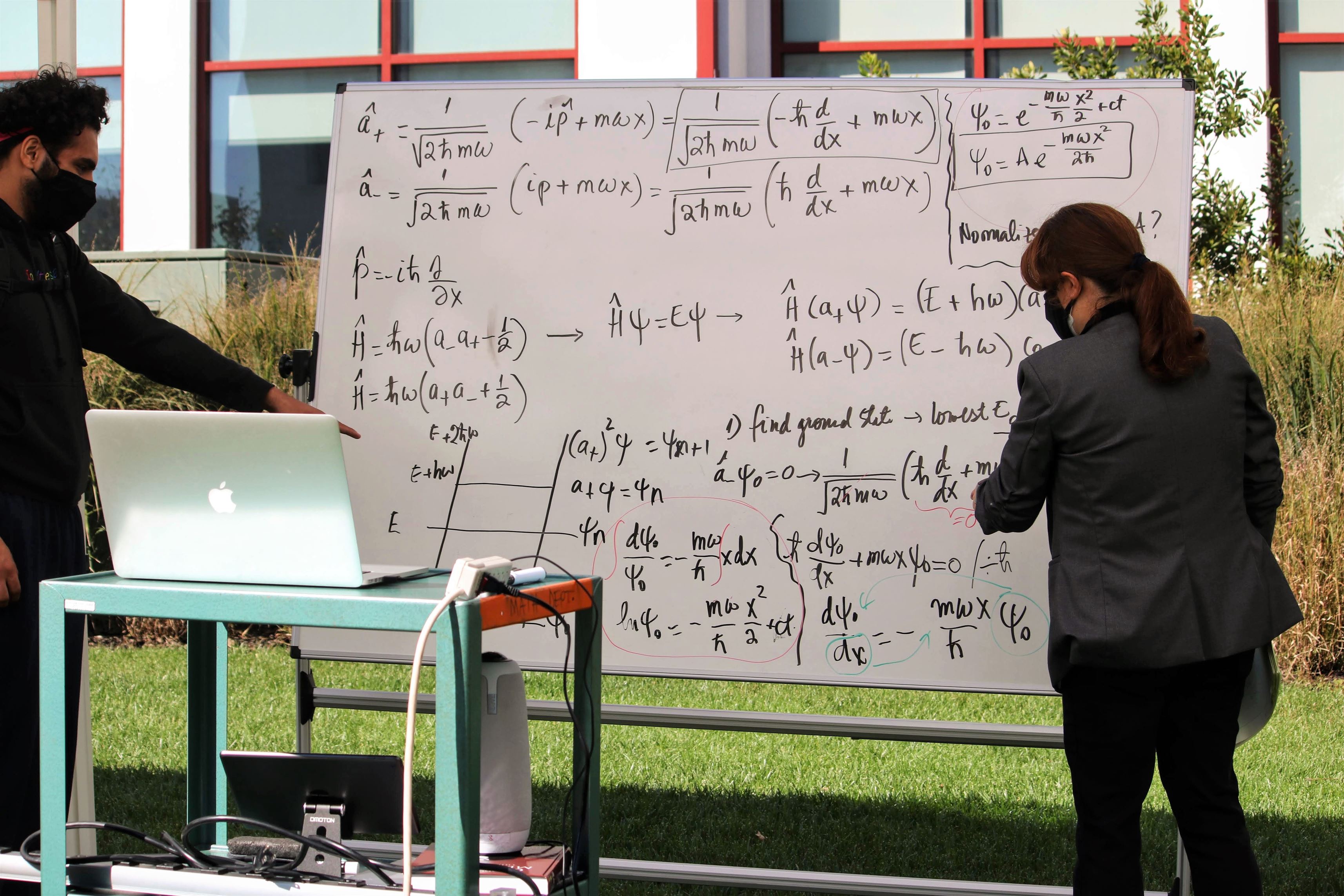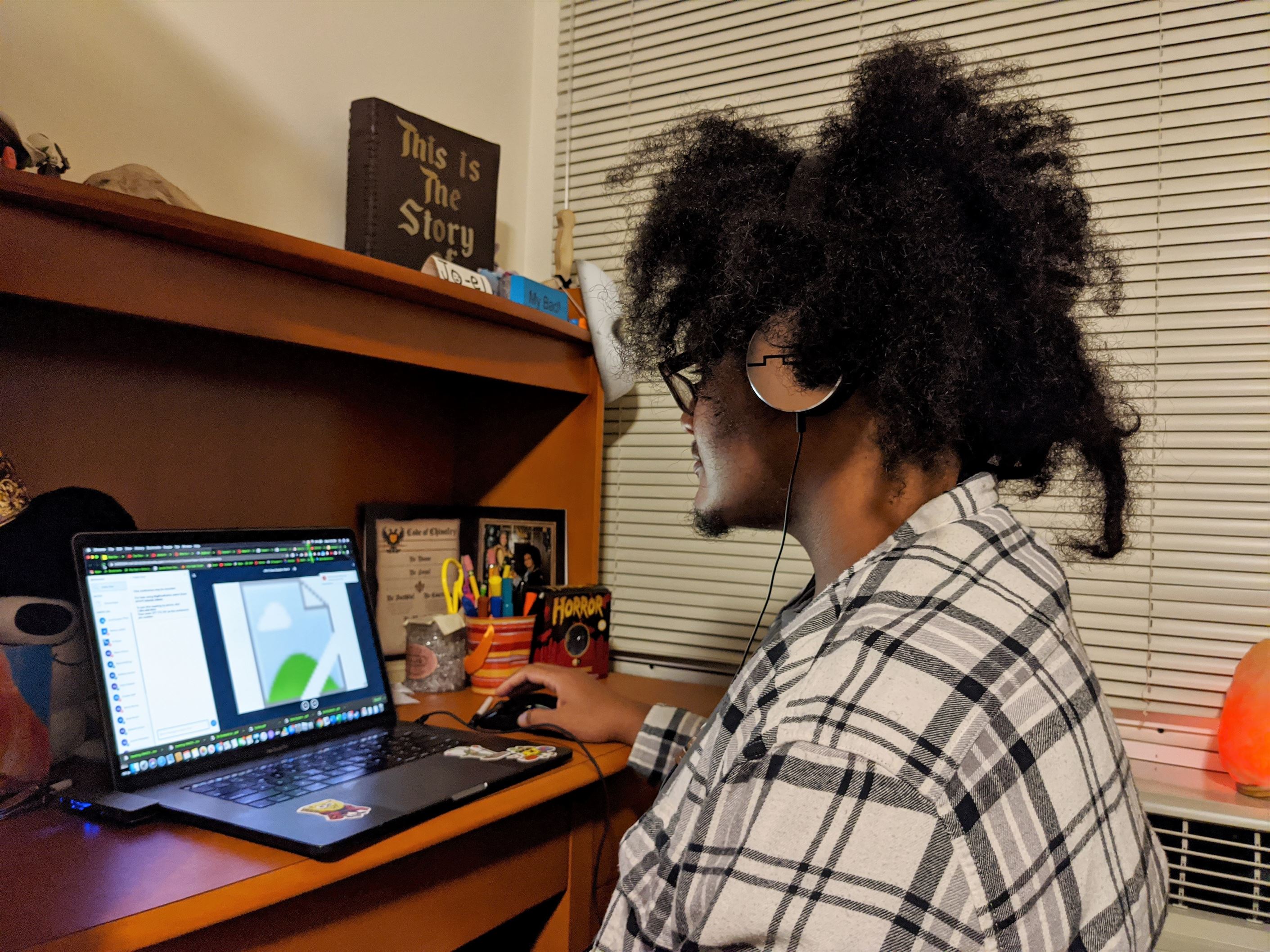With the first full month of school behind them, it seems Montclair State University students have regained their footing amidst the changes in campus life. There is still the divide between virtual and in-person learning, and coronavirus (COVID-19) regulations remain in the air, but it is clear that the university is doing its best to make sure students feel welcomed and comfortable.
The best way to gauge the campus community’s pulse is through the Student Government Organization (SGA). Ernst Lozin, the SGA president, has overseen the transition of the student organizations into COVID-19 safe spaces.
“I think the SGA has done a tremendous job with trying to make sure that students at least have a chance and have the capabilities to be able to still host events virtually or in person. Although it is not what it was last year, I believe that in hopes of a better tomorrow, we have to prepare for today,” Lozin said.
In spite of these rough times, the SGA is doing its best to continue with what they have always done: speaking for their fellow students.
“We’re just trying our best to make sure the students still have a voice, still a part of meeting with the school administration, still hearing their concerns,” Lozin said. “The mindset is still the same: coming in [and] showing unity. Our objectives are the same as if it was a regular year. The only difference is we aren’t all together in the same room.”
Student organizations are still in full throttle with regulations to keep participants safe. Lozin pointed out that organizations are doing their best given the circumstances and are working to push events through for the students.
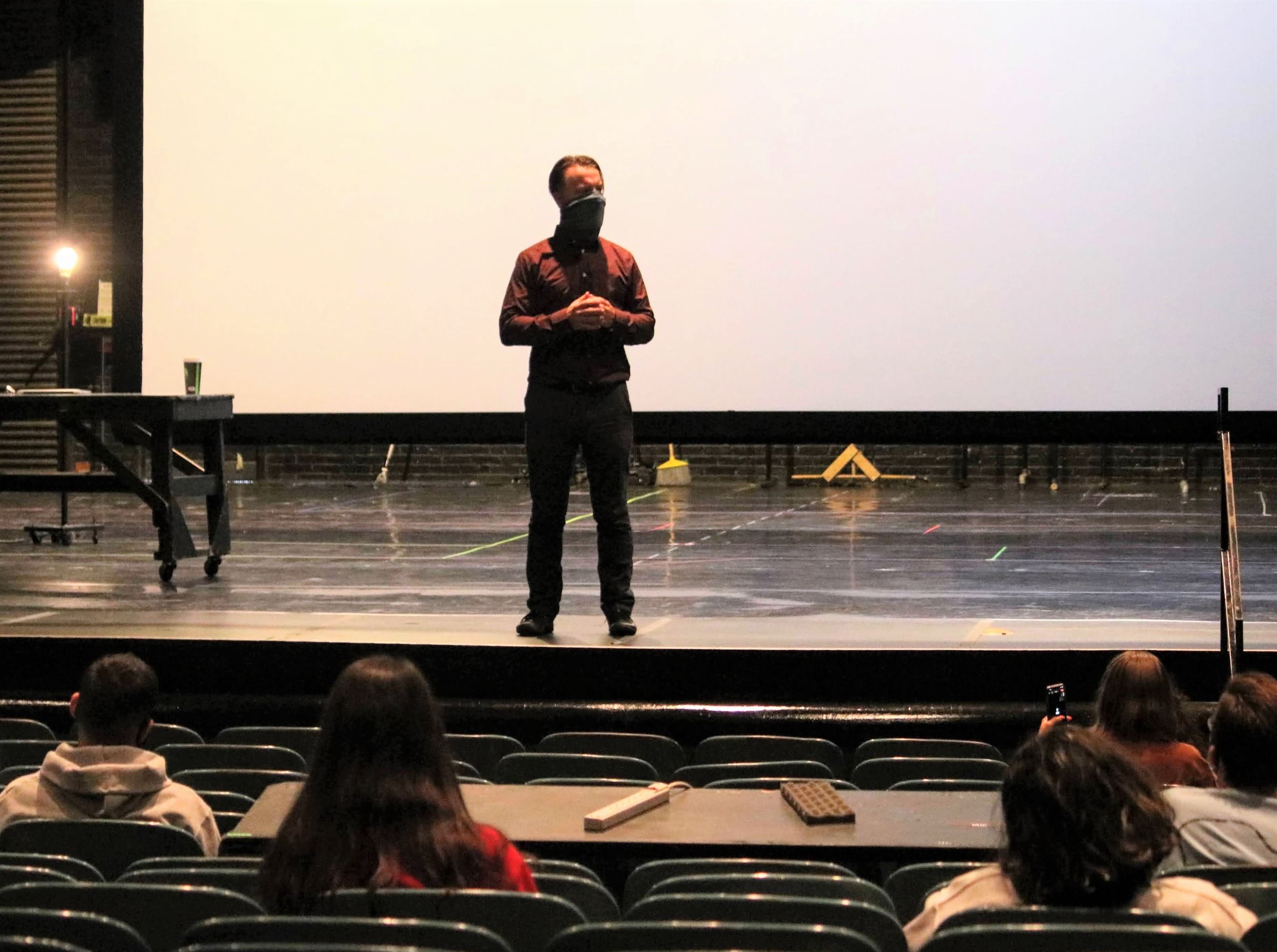
Professor Michael Koch addresses students in his Introduction to Communication and Media Arts class from the stage of Memorial Hall.
Photo courtesy of Nicole Comly
There has also been a recent upsurge of students on campus at night. People are often seen among their group of friends enjoying the fresh air in the far less populated time of day.
A’Lysai Robinson, a freshman acting major, is taking advantage of the late night atmosphere.
“It is definitely a lot cooler during the night. There’s also not a lot of people around, so you can be as free as you want to be. I feel as if being around people in the daytime could be a little uncomfortable especially with all the conditions going on in the world, [with] the pandemic. I just feel like it is better to be outside during the night,” Robinson said.
Justin Goldberg, a sophomore marketing major, likes to relax with his friends outside after a long day of sports practice.
“We are both athletes and we both have other priorities during the day, so nighttime is a great time to relax and do homework,” Goldberg said.
Athletes are having a rough time this semester. Some are able to practice while others are not.
Morgan Connon, a senior justice studies and psychology major, is on the women’s lacrosse team. Connon explained how practices have been progressing throughout the semester.
“The first few days of practice were very different. We had to be in small groups and had to be on opposite sides of the field. After about a week or so, we were able to practice all together as a team, which was exciting. Things also started off very different because we weren’t allowed to play with any contact at all, but after a week of practice we were able to practice normally with contact and be all together,” Connon said.
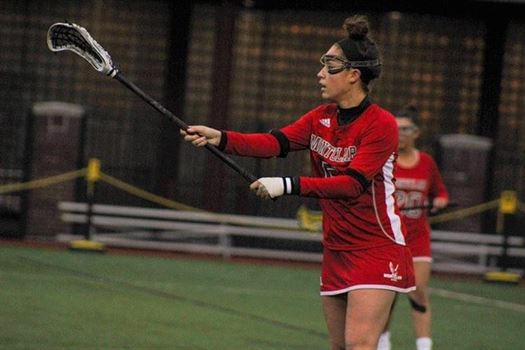
Morgan Connon, a lacrosse player, is facing new restrictions during her team’s practice sessions.
Corey Annan | The Montclarion
Connon’s coaches have to wear a mask whenever they go near the team and the time allowed for practice has been restricted to an hour and a half. Although there have been many changes, Connon believes that the athletic department is doing its best for the athletes.
“Overall though, I think the athletic department is doing a very good job of keeping everyone safe and healthy and I’m very grateful that we’re having a fall ball season. Many schools weren’t given the opportunity to have one, so we’re all very lucky and grateful for that,” Connon said.
The athletes are not the only students who need to practice. Elise Kohler, a junior music therapy major and flute player, gave insight into how the performing arts department is functioning.
“Coming back to campus as a performing arts major has been a lot different. It’s definitely difficult to get used to not being able to see everyone and in some cases, not being able to perform in person,” Kohler said. “All of [my classes] except for band are online. But it’s nice to be able to have band, where we can all safely gather together and still play music, which is something I thought totally wouldn’t happen.”
Fortunately, the performing arts students will still get to perform. This performance will be happening over Zoom and Kohler is quite excited.
“It will be different and definitely a new experience for everybody and [it is] cool that we can still do it,” Kohler said.
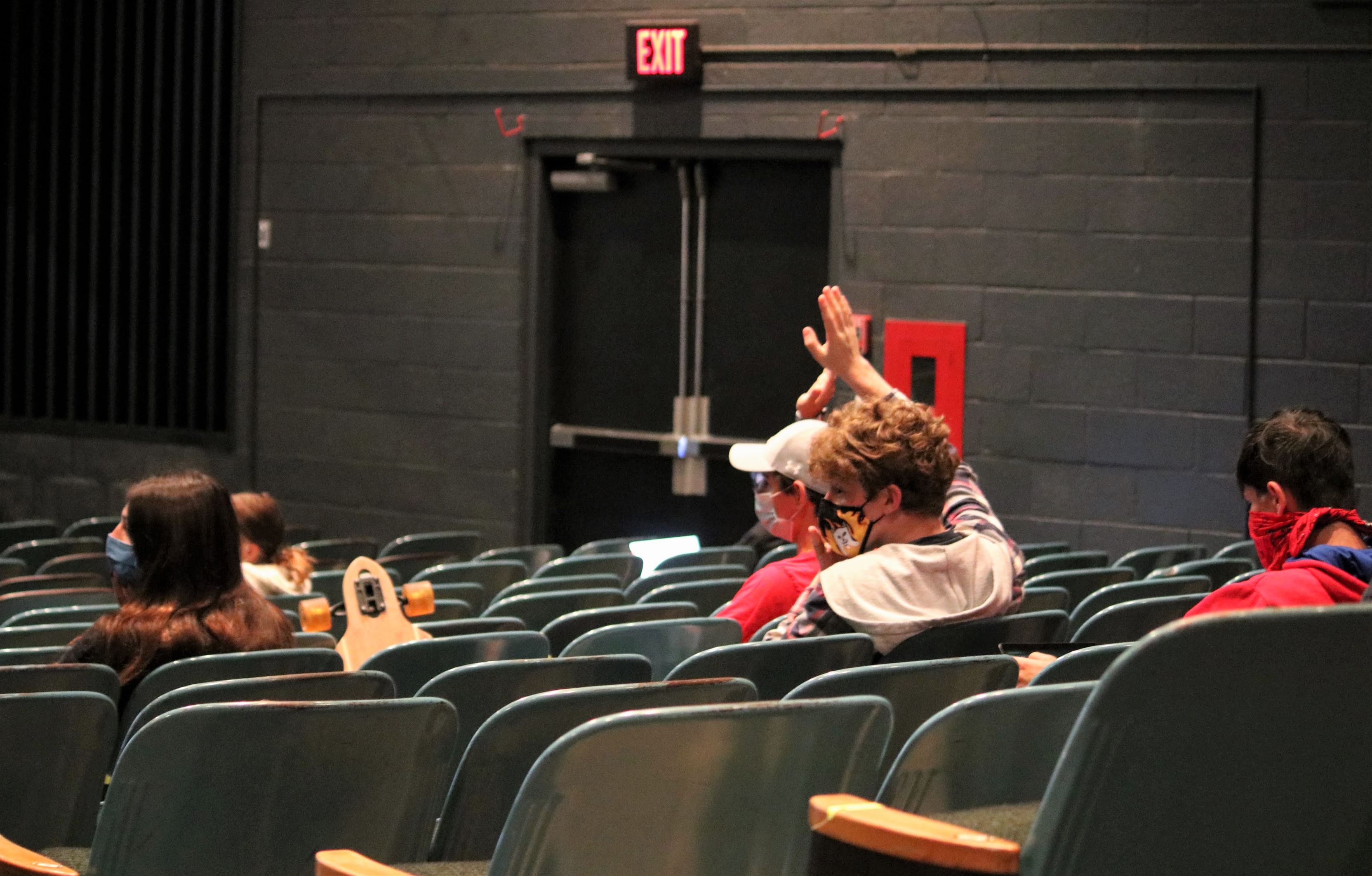
Socially distanced students raise their hands during an in-person lecture in Memorial Auditorium.
Photo courtesy of Nicole Comly
Other institutions have also adapted in order to benefit the Montclair State community. Dining Services and Residence Life are crucial organizations for on-campus students and have been doing their part to keep students safe and involved.
Marketing manager for Montclair State Dining Services, Lindsey Anderson, ensures that the Dining Services staff is taking the pandemic seriously and are doing all they can to keep students safe while they get their meals.
“We want our guests to know that we have comprehensive measures in place to ensure we effectively manage the spread of illnesses such as COVID-19,” Anderson said. “We are taking every step to ensure a safe food service environment and to reinforce our stringent health and hygiene standards.”
Dining Services also boasts new food-focused events and promotions for this semester, such as food festivals and a “Do It Yourself” series, to keep students engaged in their dining experiences.
Residence Life is also doing its best to engage with their community. Jeanine Stroh, executive director of the Office of Residence Life, stated that Residence Life has hosted more than 25 events for students, both virtual and in person.
“[Resident assistants] are currently meeting with every resident for check-ins and we are getting ready to add a series of workshops for our students. Each building is finding opportunities to connect [with its students], from sidewalk chalk, to weekly community meetings, to arts and crafts and cooking demos, our staff aims to provide safe, fun and developmental opportunities for all of our residents,” Stroh said.
The university is doing all that it can to keep students both safe and engaged. This then raises the question of how the students feel the university is doing.
Jo-El Gordon, a senior film major, feels that Montclair State has done some positive things for the students.
“I’ve noticed while walking around campus a couple of times [that] they definitely held true to their word about the fact that there are hand sanitizer stations, virtually everywhere,” Gordon said.
There are some things, however, that some feel the university could improve. Patrick Lynch, a junior English major, feels Montclair State needs to correct its internet problems.
“I think that with the online classes they could have figured something out for students on campus. Especially with the Wi-Fi. It’s very iffy and that makes taking classes online extremely difficult,” Lynch said.
There are some negatives that are out of the university’s control. Gordon lamented over how badly he felt for the freshmen.
“I feel like [freshmen] are never going to be able to experience that Red Hawk pride you get to experience that first month where everyone’s getting to know each other. Since you’re a new face on campus, since everything is virtual, unfortunately, it’s also much more distant. There’s not as much of a necessity to meet new people,” Gordon said.
Not all students are able to be on campus to experience what students like Gordon or Lynch do. Many have elected to stay home for fear of their health. While some may be immunocompromised, others simply find it pointless to come to campus with no face-to-face classes on their schedule.
Meghry Tutunjian, a graduate student in counseling in student affairs/higher education, has all online classes. Like many students, Tutunjian is frustrated.
“Now I’m taking two classes and they are both asynchronous. I feel like I am just teaching myself. The fact that classes are asynchronous and we are paying full tuition, it’s not fair. If I am going to sit down and teach myself, why am I paying full tuition?” Tutunjian said.
Regardless of how hard online classes can be for some, it seems this is going to be the direction the university holds for a while. Even though 50% of classes next semester will be in-person, the rest will continue online. Next semester, if things start to shift toward the direction of normalcy, it is safe to say that the university will continue to prioritize and value the needs of its students before anything else.

